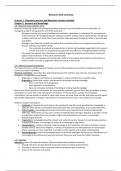Samenvatting
Research Skills combined summary book and lecture notes
This is a summary of the book of the research skills course given in the MSc Strategic Management. The summary is combined with lecture notes to provide the most comprehensive understanding.
[Meer zien]




